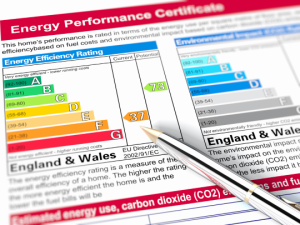Other Services
We also offer a range of additional services such as ESOS, DEC, EPC, MEPS, TM44 & SECR reports which are legally compliant audits and certifications. These are suitable for you if your company needs an Energy or Carbon audit for regulatory compliance.
Display Energy Certificates (DEC)
A Display Energy Certificate (DEC) shows the energy performance of a building, based on the operational rating, on a graphical scale from A (very efficient) to G (least efficient). A DEC must be accompanied by an advisory report which outlines how the organisation can reduce their energy consumption.
A DEC is required annually for public buildings and those occupied by public authorities which have a total useful area greater than 250m2 and provide a public service to a large number of people.

Energy Performance Certificates (EPC)
An Energy Performance Certificate (EPC) tells you how energy efficient a property is, which is represented on a scale from A (most efficient) to G (least efficient). An EPC contains information about a property’s energy use and typical energy costs and recommendations about how to reduce energy use and save money. An EPC is a legal requirement whenever a property is built, sold or rented and is valid for 10 years providing there have been no substantial structural changes.
Buildings that are exempt from needing an EPC include:
- Places of worship
- Temporary buildings that will be used for less than 2 years
- Stand-alone buildings with total useful floor space of less than 50sqm
- Some buildings that are due to be demolished
- Industrial sites, workshops and non-residential agricultural buildings that do not use a lot of energy
- Holiday accommodation that’s rented out for less than 4 months a year or is let under a licence to occupy
- Listed buildings
- Residential buildings used less than 4 months a year
Air Conditioning (TM44)
Air conditioning inspections are a legal requirement under the Energy Performance of Buildings Directive (EPBD). This legislation is designed to improve the energy efficiency of public and commercial buildings, and reduce carbon emissions. If your air conditioning unit is not inspected every 5 years, you will be fined £300 per air con unit.
Your energy inspection will include a visual assessment of your air conditioning system & an examination of your air conditioning equipment and controls. Your assessor will provide you with a certificate and report that tells you:
- the current efficiency of your equipment
- suggestions for improving the efficiency of your equipment
- any faults and suggested actions
- how to reduce your air conditioning use
You do not have to follow the recommendations, but you may save money if you do.
Minimum Energy Performance Standards (MEPS) also referred to as Minimum Energy Efficiency Standards (MEES)
Since 1 April 2018, landlords of non-domestic rented properties have only been permitted to grant a new tenancy, or to extend or renew an existing tenancy, if their property has at least an Energy Performance Certificate (EPC) E rating, unless they have registered a valid exemption.
From 1 April 2023, the requirement for non-domestic landlords to obtain at least an EPC E rating, unless they have registered a valid exemption, applies to all privately rented non-domestic properties (even where there has been no change in tenancy). If your property is currently empty, and you are not planning to let it, you don’t need to take any action to improve its rating until you decide to let it again.
The regulations do not apply to non-domestic rented properties that are either:
- granted for a ‘term certain’ (the original term or time period granted by a tenancy) not exceeding 6 months (unless the tenancy agreement contains provision for renewing the term or extending it beyond 6 months from its beginning, or, at the time it is granted, the tenant has been in occupation for a continuous period of more than 12 months)
- granted for a ‘term certain’ of 99 years or more
Streamlined Energy and Carbon Reporting (SECR)

SECR aims to bring the benefits of carbon and energy reporting to more businesses. The reporting framework is intended to encourage the implementation of energy efficiency measures, with both economic and environmental benefits, supporting companies in cutting costs and improving productivity at the same time as reducing carbon emissions.
Under the legislation, three types of business groups will be affected and will need to annually report their Greenhouse Gas emissions (unless they meet certain exemption criteria), along with detailing how they plan to reduce them.
The affected business groups are:
- Quoted companies of any size that are already obliged to report under mandatory greenhouse gas reporting regulations.
- Unquoted companies incorporated in the UK that meet the definition of ‘large’ under the Companies Act 2006 will have new reporting obligations. This applies to registered and unregistered companies. Note that the criteria for ‘large’ differs from the ESOS Regulations.
- ‘Large’ Limited Liability Partnerships (LLPs) will be required to prepare and file a ‘Energy and Carbon Report’.
Unquoted companies or LLPs are defined as ‘large’ if they meet at least two of the following three criteria in a reporting year:
- a turnover of £36 million or more;
- a balance sheet of £18 million or more; or
- 250 employees or more
Energy Saving Opportunity Scheme (ESOS)
ESOS is a mandatory energy assessment scheme for organisations in the UK that meet the qualification criteria. The Environment Agency is the UK scheme administrator. Organisations that qualify for ESOS must carry out ESOS assessments every 4 years. These assessments are audits of the energy used by their buildings, industrial processes and transport.
The ESOS audit is designed to identify tailored and cost-effective measures to allow participating businesses to save energy and achieve carbon and cost savings. The audit costs are estimated to be significantly outweighed by the savings from implementing the recommendations.
If your business employs more than 250 employees, or has an annual turnover in excess of £44 million, and an annual balance sheet total in excess of £38 million, then you must comply with ESOS. Organisations who fail to comply with the legislation are at risk of receiving a hefty fine of £50,000 from enforcers.
To comply, you will need to submit an ESOS audit that details:
- Your organisational structure (who the submission covers)
- Your total energy consumption across a 12-month period that crosses the qualification date
- Individual energy audits on your property portfolio, fleet & industrial processes
- An extensive & robust evidence pack that allows the Environment Agency to audit your submission




